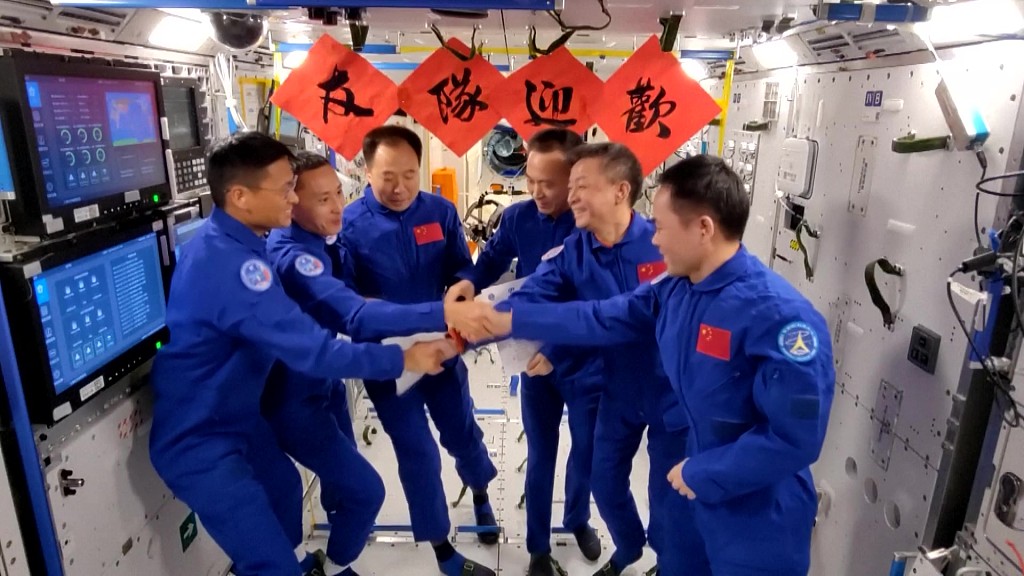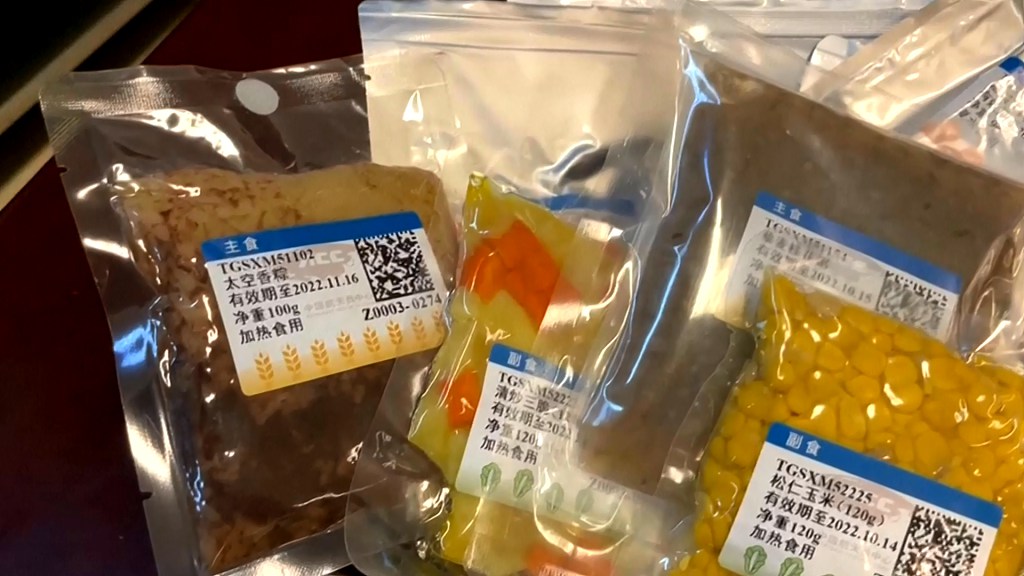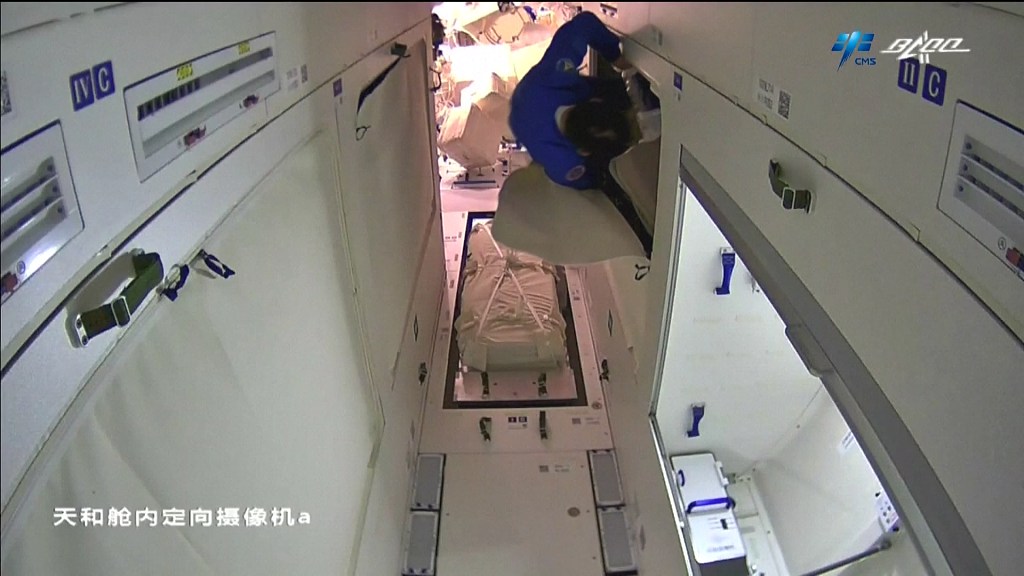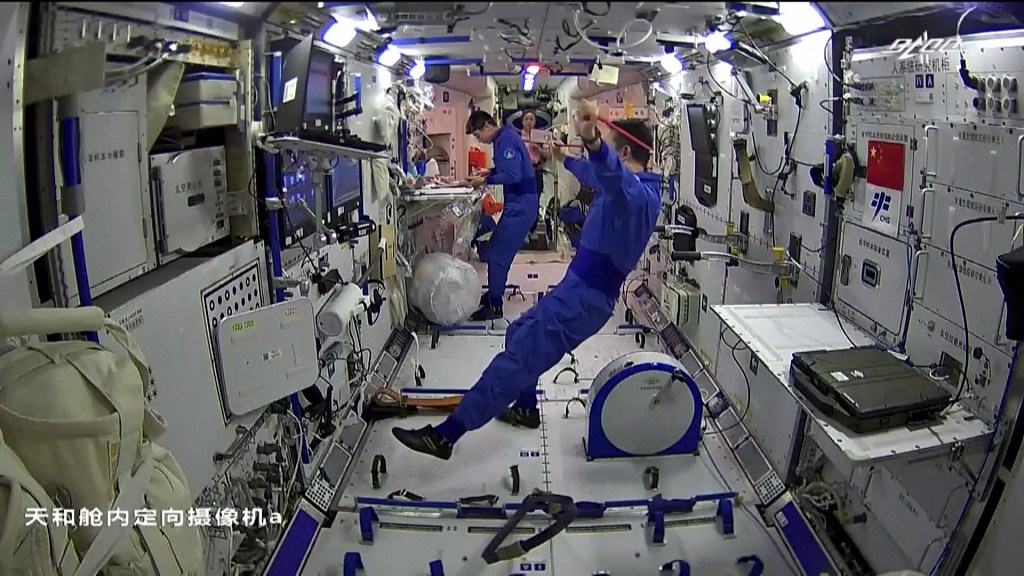
The Shenzhou-15 and Shenzhou-16 crew meet in China's space station, June 2, 2023. /China Manned Space Agency
The Shenzhou-15 and Shenzhou-16 crew meet in China's space station, June 2, 2023. /China Manned Space Agency
The recipes for China's astronauts, or taikonauts, in space are selected after foretaste among a wide range of people on the ground, and garbage sorting is required even in space, said Wu Dawei, the deputy chief designer of the China Manned Space Program's taikonaut system. She shared more details about life in orbit during a recent interview with China Media Group.

Some of the food prepared for taikonauts. /China Manned Space Agency
Some of the food prepared for taikonauts. /China Manned Space Agency
Space kitchen for balanced nutrition
"Not all ground nutrient standards are applicable in space, where the taikonauts' bones are in a state of decalcification, so we have to be very careful in the use of calcium," said Wu.
She said the crew will experience greater calcium loss in space compared to people on the ground. Therefore, they must find a balance between supplementing too much calcium, which causes stones to form in the body, and too little, which can lead to other problems.
"Therefore, the dietary standard for the intake range of calcium, and other elements like iron, sodium, as well as some vitamins like folic acid, are going to vary," said Wu.
Besides dietary nutrient tablets, the taikonauts rely more on their food for balanced nutrition.
"The food developed for the taikonauts is first tasted by a wide range of people on the ground, and a large amount of data will be collected before selecting various food to form a recipe, which contains balanced energy and nutrition," Wu explained.
At present, the taikonauts in the space kitchen can bake bread and some other staple food and roast meat, peanuts or sweet potatoes, said Wu. The kitchen will be equipped with cold chain technology in the future, at which time frozen raw materials can be automatically processed and prepared.
She added that the taikonauts will conduct fruit and vegetable cultivation in orbit this time.
Garbage sorting required
Inside the space station, a confined environment, the disposal of different types of waste, including batteries, chemicals, biological products, household waste and clothing, can vary, said Wu.
She said there are many buckets in the space station to separate garbage, such as the dry and the wet. Fecal waste, waste from their daily lives and experiments, and scraps such as broken equipment components are disposed of separately to maintain a safe environment, for example, preventing microbes from growing everywhere.
The crew's solid waste will return with their re-entry capsule after their six-month mission at the space station. The waste will be sent out of the capsule when it enters the Earth's atmosphere, eventually disappearing due to atmospheric friction and combustion.

The sleeping area in China's space station. /CFP
The sleeping area in China's space station. /CFP
Better sleep in space than on the ground
From previous missions, the taikonauts have been sleeping well in space and have better sleep efficiency in the space station than on the ground.
"One reason is that the taikonauts were in a state of all-out preparation before the mission, and once they arrived at the space station, they quickly adapted to the environment and felt more at ease, which contributed to a higher sleep efficiency," said Wu.
"Our taikonauts really have a very good psychological quality, and it does prove that we are making continuous progress in the manned space flight."

The Shenzhou-13 crew exercise at the space station. /CFP
The Shenzhou-13 crew exercise at the space station. /CFP
Ensuring a safe return
To guarantee a smooth return home, the taikonauts will undertake a series of training.
"In their 180 in-orbit days, the crew have fully adapted to the weightless environment, so they will certainly endure a readjustment process when they return to the ground," said Wu.
The crew should be well prepared both physically and psychologically, said Wu. There is a comprehensive system for their physical training. Dedicated plans will be designed for the taikonauts, depending on their age, personal physical state, and so on.
The taikonauts may be excited when they are to return to Earth, which may interfere with their work or rest. Therefore, "we will also help them adjust their state, such as calming them down through daily communication," said Wu.
She said taikonauts are usually 3 to 5 centimeters taller than they are on Earth, according to data from domestic and foreign manned spaceflights. However, they will revert to their previous height due to Earth's gravity.
"We will also record the changes of their height and bones, in order to make corresponding auxiliary work more accurate for the subsequent development of our project," she added.
Their sense of taste and smell also change after return, said Wu.
"For example, some may feel that the food is sourer than before, and some may prefer food with stronger flavors."
Wu said they are also researching nutrition metabolism with new advanced technologies, trying to figure out "the root causes of all the changes in human biology and physiology, from cells to organ tissues, during different flight mission phases."